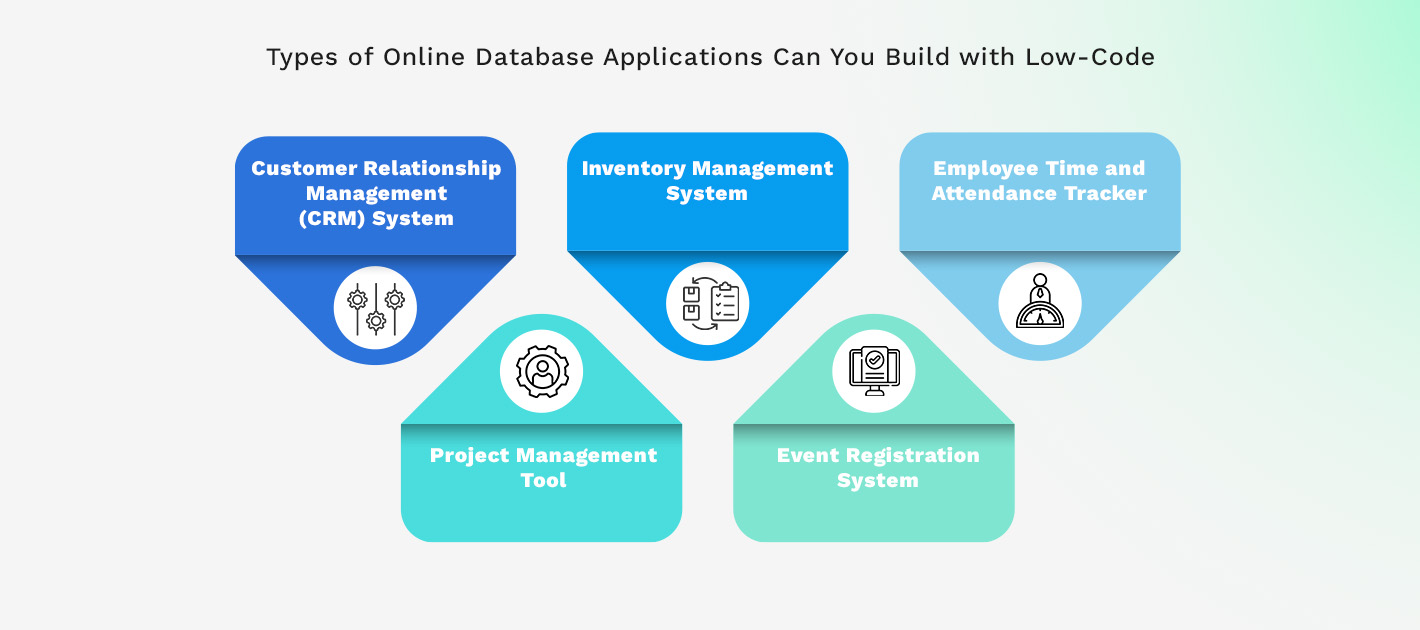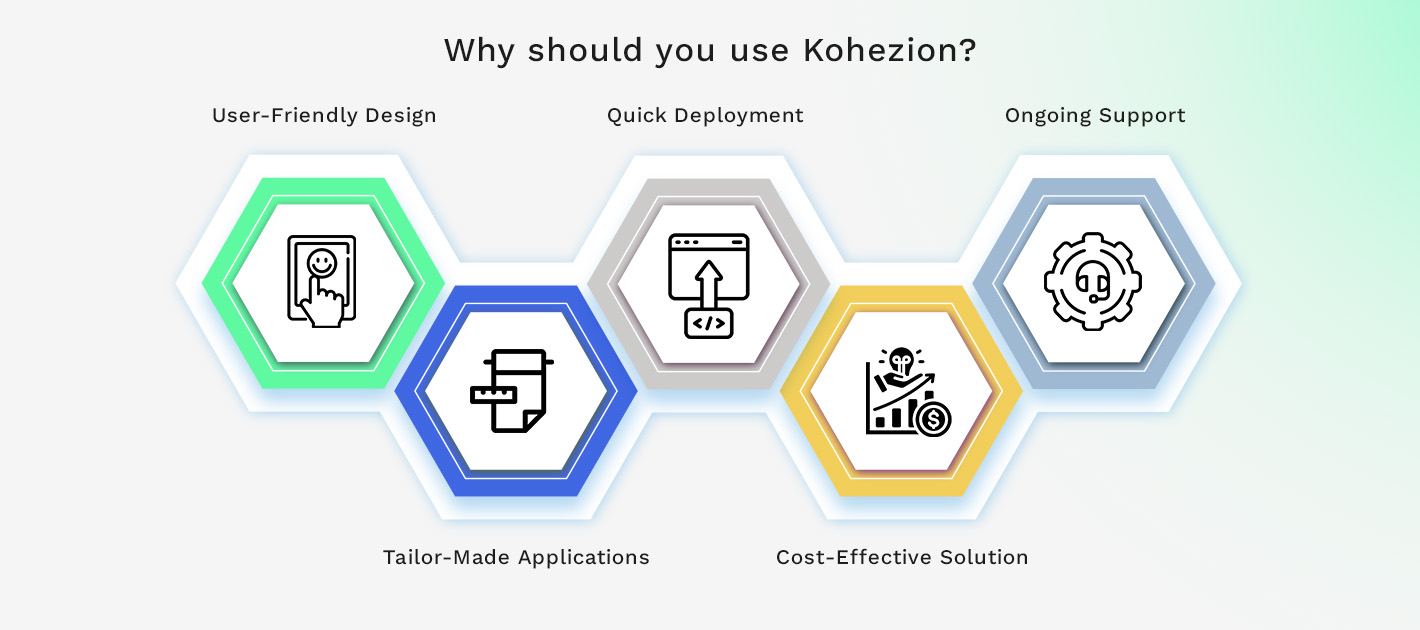Innovations like low-code development and online database software make technology more accessible than ever. Whether you're a tech-savvy business owner or a curious enthusiast, understanding these tools can empower you to create custom applications quickly and efficiently. But what is the difference between low-code development and online database software? And do they have something in common?
Low code and low code development have become exceedingly popular over the last few years because almost anyone can create software applications or systems with low code technology. As a result, companies' adoption of low code development is driven by the need for faster application development, improved collaboration, increased agility, and leveraging data more effectively.
Embracing low code helps companies transform their development processes, enhance business outcomes, and gain a competitive edge in today's fast-paced digital landscape. Before we dive into it further, let’s talk about some of the basics of low code.
We'll buid your first application for you. At no extra cost.
Let us build your first business application for free. Go from an idea to an application in under 2 weeks.

What Is Low-Code Development?
Low code development refers to a software development approach that allows users to create applications with minimal coding or programming knowledge. It provides a visual interface and pre-built components, enabling users to quickly drag and drop elements to build applications.
Low-code platforms offer a simplified development environment that reduces the need for traditional hand-coding, making application development more accessible to non-technical users. These platforms often integrate with online databases, empowering users to create and manage databases alongside their application development process.
What Is Online Database Software?
Online database software allows you to easily store, manage, and manipulate data from anywhere with an internet connection. There is no need to set up servers or fret over hardware because your data is safely housed in the cloud. Your data is protected with robust security measures and automatic backups to prevent loss. You can tailor your database with custom fields and forms that fit your business processes. This allows you to analyze trends, draw insights, and make data-driven decisions to drive your business forward.
Examples of Low-Code Platforms
Explore leading examples of low-code platforms revolutionizing app development. From intuitive interfaces to seamless integrations, discover how Kohezion, Microsoft PowerApps, OutSystems, Mendix, and Appian empower users to create custom solutions with minimal coding expertise.
1. Kohezion

Kohezion is an intuitive low-code platform that allows citizen developers to create custom applications and databases without extensive coding knowledge. With its visual interface and drag-and-drop functionality, Kohezion empowers users to build applications quickly and efficiently while seamlessly managing their data.
Why is Kohezion on the best list?
Kohezion distinguishes itself by providing a user-friendly interface coupled with powerful customization options, allowing users to design applications that align perfectly with their business requirements. Its intuitive drag-and-drop features streamline the development process, making app creation a straightforward endeavor even for those with minimal technical expertise.
Top Features:
- Customizable templates catering to a wide range of business needs.
- Robust data management capabilities, including powerful filtering and sorting options.
- Seamless integration with popular third-party services, such as Google Drive and Dropbox.
- Flexible permission settings for controlling access to sensitive data.
- Dynamic reporting tools for extracting actionable insights from your data.
Benefits:
- Accelerates app development and deployment, saving time and resources.
- Empowers users to take control of their data and streamline workflows.
- Enhances collaboration among team members through shared access to centralized data.
- Facilitates real-time monitoring and analysis of key performance metrics.
- Supports scalability, allowing applications to grow alongside your business needs.
Cons:
- Limited advanced customization options compared to some other platforms.
- May require additional training for users unfamiliar with low-code development concepts.
Best for: Kohezion is ideal for businesses of all sizes seeking a user-friendly, cost-effective solution for creating custom applications tailored to their unique processes and requirements. Whether you're a small startup or a large enterprise, Kohezion allows you to harness the benefits of low-code development without sacrificing functionality or flexibility.
2. Microsoft PowerApps

If you're looking for a seamless integration with your Office 365 tools, then Microsoft PowerApps is the best choice. This low-code platform allows you to quickly assemble apps that speak the same lingo as your Microsoft ecosystem.
Why is Microsoft PowerApps on the best list?
Microsoft PowerApps enables you to create apps that fit seamlessly with your Microsoft workflows, and its ease of use is impressive thanks to a user-friendly drag-and-drop interface.
Top Features:
- Vast integration with Office 365, Dynamics 365, and Azure services.
- Prebuilt AI components to make your apps smarter.
- A common data service to seamlessly draw and push data to your Microsoft stack.
- Various templates to get you up and running in no time.
- Power Automate to streamline workflows alongside apps.
Benefits:
- Reduces the time and cost associated with custom software development.
- Enhances productivity by automating routine tasks.
- Makes app deployment across various platforms utterly painless.
- Encourages collaboration and sharing across your organization.
- Facilitates efficient data utilization and reporting with Power BI integration.
Cons:
- Complexity can increase with more advanced customizations.
- Dependency on other Microsoft services can be limiting for some.
Best for: Microsoft Power Apps is best for organizations already invested in Microsoft services and looking to create custom business applications without extensive coding.
3. OutSystems

OutSystems offers a platform for creating applications quickly without needing complicated backend connections. It combines speed, customization, and scalability, making it a top choice for big-business software needs.
Why is OutSystems on the best list?
OutSystems gets top marks for its enterprise-level capabilities and the ability to develop applications that can scale with your business needs. It makes the app development process quicker, smarter, and more reliable.
Top Features:
- Advanced, enterprise-ready features for full-scale application development.
- Extensive customization options that cater to both beginners and seasoned developers.
- Robust scalability to handle the needs of growing businesses and large enterprises.
- Integrations with existing systems to protect and extend legacy investments.
- Strong security protocols, ensuring applications are safe from the get-go.
Benefits:
- Speeds up digital transformation efforts across all levels of an organization.
- Bridges the gap between technical and non-technical users with its intuitive design.
- Encourages innovation by reducing the barriers to experimenting with new ideas.
- Helps manage the entire application lifecycle from design to deployment and updates.
- Offers continuous integration and delivery for a streamlined workflow.
Cons:
- Can be more expensive than some other low-code platforms.
- Might have a steeper learning curve due to its vast array of features.
Best for: OutSystems is best suited for medium to large-sized enterprises looking for robust, scalable applications and a platform that meets various development expertise levels.
4. Mendix

Mendix boasts a platform that helps business and IT teams work together to create and grow web and mobile apps. Known for its robust, scalable solutions, Mendix can be used by both professional and less experienced developers.
Why is Mendix on the best list?
Mendix offers collaborative development with its user-friendly yet powerful platform. It truly caters to a spectrum of users from various backgrounds and skill levels, making it a standout choice for team-oriented app creation.
Top Features:
- Intuitive model-driven development environment for rapid prototyping and deployment.
- A broad suite of tools for collaboration, allowing teams to work together seamlessly.
- Out-of-the-box components and a large marketplace of widgets and modules.
- Strong support for agile project management methodologies.
- One-click deployment that simplifies the process from development to production.
Benefits:
- Greatly reduces the time to market for new applications.
- Simplifies the development process, making it inclusive for non-coders.
- Offers full lifecycle support from ideation through maintenance and beyond.
- Highly adaptable for any changes or pivots a project might require.
- Connects with many services and systems, making integration a smooth process.
Cons:
- The price can be high for smaller businesses or startups.
- The wide variety of features might overwhelm new users.
Best for: Mendix is best for organizations looking to innovate collaboratively, where business analysts, IT professionals, and developers co-create applications that make a difference.
5. Appian

Appian is renowned for its powerful business process automation abilities. It offers a unified platform that bridges the gap between creating apps and automating workflows, making it a powerful tool for improving operations.
Why is Appian on the best list?
Appian blends low-code app development with business process management, driving efficiency and continuous organizational improvement.
Top Features:
- Seamless integration of data, processes, and applications for a unified user experience.
- Robust business process management to streamline operations.
- Comprehensive case management capabilities tailored for complex scenarios.
- Strong emphasis on mobile and responsive design.
- Advanced security features ensure your applications are safe and compliant.
Benefits:
- Connects legacy systems with modern applications for a cohesive IT landscape.
- Provides deep insights into business processes to drive informed decision-making.
- Empowers teams to create complex applications with relative ease.
- Adapts to changing business needs with agile development and deployment.
- Fosters a culture of innovation by enabling rapid experimentation and iteration.
Cons:
- Its extensive feature set may present a steeper learning curve for new users.
- The cost may be higher compared to other low-code platforms, considering its enterprise focus.
Best for: Appian is ideal for organizations with intricate processes looking to automate their operations and create powerful applications that align with their business objectives.
What Types of Online Database Applications Can You Build with Low-Code?
1. Customer Relationship Management (CRM) System
Use low-code platforms to construct a tailored CRM system that serves as the center of all your customer interactions. These systems consolidate customer data, communication logs, sales pipelines, and marketing efforts, empowering your team to nurture leads and build lasting client relationships.
Best for: CRM systems built through low-code platforms are ideal for businesses looking for a flexible solution that adapts to their unique customer management processes without the hefty price tag of custom software development.
Why it made the list:
- Customizable Data Views: Organize customer information to suit your business needs.
- Automated Communication: Keep track of interactions and follow-ups with automated reminders and notifications.
- Integration with Marketing Tools: Seamlessly sync CRM data with email marketing platforms and social media channels.
- Reporting and Analytics: Gain insights into customer behavior and sales performance with robust reporting features.
- Mobile Accessibility: Access customer data and update records on the go with mobile-friendly interfaces.
2. Project Management Tool
You can also use a low-code platform to create a personalized project management tool. These tools act as command centers for your projects, pulling together tasks, timelines, resources, and communications.
Best for: Project management tools built through low-code platforms are best for teams that need a customized solution to match their unique processes without the lengthy development times usually associated with custom-made software.
Why it made the list:
- Customizable Dashboards: Visualize your team's workflow in a way that aligns with your methods.
- Real-time Collaboration: Keep everyone in sync, whether in-office or remote.
- Task Automation: Reduce the time spent on monotonous admin work and focus on what matters instead.
- Integration Capabilities: Connect with other tools to create a seamless tech ecosystem.
- Mobile Access: Stay updated on your projects anytime, anywhere with mobile functionalities.
3. Inventory Management System
An inventory management system designed on a low-code platform can be the cornerstone of your supply chain, ensuring you have the right products in the right quantity, at the right time, and all without overstocking or stockouts.
Best for: Businesses that require a tailored approach to track their inventory levels, orders, sales, and deliveries would benefit immensely from an inventory management system developed with low code.
Why it made the list:
- Real-Time Tracking: Instant updates mean you know where your inventory stands at all times.
- Automated Alerts: Get notifications before you hit critical stock levels.
- Reporting and Forecasting: Take the guesswork out of planning with data-driven insights.
- Vendor Management: Keep your vendor details and interactions neatly organized in one place.
- Scalability: As your business grows, so does your inventory system's capacity to handle more products and complex operations.
4. Event Registration System
Build an event registration system with a low-code platform to manage RSVPs, ticketing, and participant details smoothly. These systems are crucial for successful event planning, ensuring a seamless experience for both attendees and organizers.
Best for: An event registration system created via low-code is perfect for event planners, nonprofits, and businesses that regularly host events and need a custom solution to manage attendees efficiently.
Why it made the list:
- Custom Registration Forms: Tailor your sign-up sheets to gather all the necessary attendee information.
- Integrated Payment Processing: Easily handle event fees with secure transactions.
- Automated Confirmations and Reminders: Keep your participants informed and engaged.
- Analytics and Reporting: Gain valuable insights into attendee demographics and event success.
- Mobile Accessibility: Enable participants to register and check in on the go.
5. Employee Time and Attendance Tracker
An employee time and attendance tracker built using low-code development tools can revolutionize how you manage your workforce. With a few clicks, you can oversee work hours, overtime, leave, and absences, all transparently and efficiently.
Best for: This is a fantastic fit for businesses of any size that want to modernize and streamline their timekeeping processes, reduce errors associated with manual entry, and foster a culture of trust and accountability.
Why it made the list:
- User-Friendly Interface: Clocking in and out is a breeze for employees.
- Real-Time Data: Instant visibility into attendance patterns helps with workforce planning.
- Leave Management: Simplifies requesting, approving, and tracking time off.
- Compliance: Keeps you in line with labor laws and regulations.
- Reporting: Insightful reports assist with payroll and performance reviews.

Build Your Own Online Database Applications Using Low-Code Development with Kohezion
Starting to create online database applications can feel overwhelming, but with Kohezion's low-code platform, it's as easy as solving a puzzle. Make custom apps that simplify your data tasks without dealing with complex coding.
Why should you use Kohezion?
- User-Friendly Design: No need for a degree in computer science—Kohezion's interface is designed for ease of use.
- Tailor-Made Applications: Construct applications that cater precisely to your business needs.
- Quick Deployment: Go from concept to launch at unprecedented speed.
- Cost-Effective Solution: Save on resources without sacrificing quality or functionality.
- Ongoing Support: Kohezion believes in empowering its clients, offering guidance and support throughout the building process.
Best for: Whether you're a small business owner aiming for growth or a department head looking to optimize your team's efficiency, Kohezion gives you the tools to build online database applications that perfectly fit your data management requirements. Transform your data into actionable insights and processes that propel your business to new heights.

Conclusion
Low-code development platforms and online database software are game-changing tools that enable anyone to create powerful, custom applications. Whether you're streamlining operations with a sophisticated CRM, managing many projects, keeping tabs on inventory, organizing an event, or tracking employee hours—low-code has a solution.
Tools like Kohezion ensure you're ready to succeed in today’s constantly changing environment. Remember, the question isn't whether to adopt low-code development and online database software but how quickly you can integrate them into your operations. Embrace these tools, and you’ll be able to shape the future of your business, one step at a time.
Start building with a free account
Frequently Asked Questions
The main differentiator is their purpose and user approach. Low-code platforms are designed to simplify the app development process, enabling users to build a wide range of applications through visual programming environments. In contrast, online database software focuses on data management, providing users with the tools to create, organize, and manipulate databases without extensive technical expertise.
Low-code solutions offer a faster and more accessible path to app development, but they can’t completely replace traditional development. Complex, specialized apps requiring deep customization still necessitate conventional coding to meet specific performance, integration, or security needs.
Online database software takes data security and privacy seriously by implementing measures like encryption, access controls, and regular updates. These tools are designed to protect your data and ensure compliance with privacy laws.
Low-code and online database software may have additional costs, such as premium features, extra storage, or advanced integration capabilities, which aren't always clear in the base price. Be sure to analyze the pricing model for potential hidden fees.



